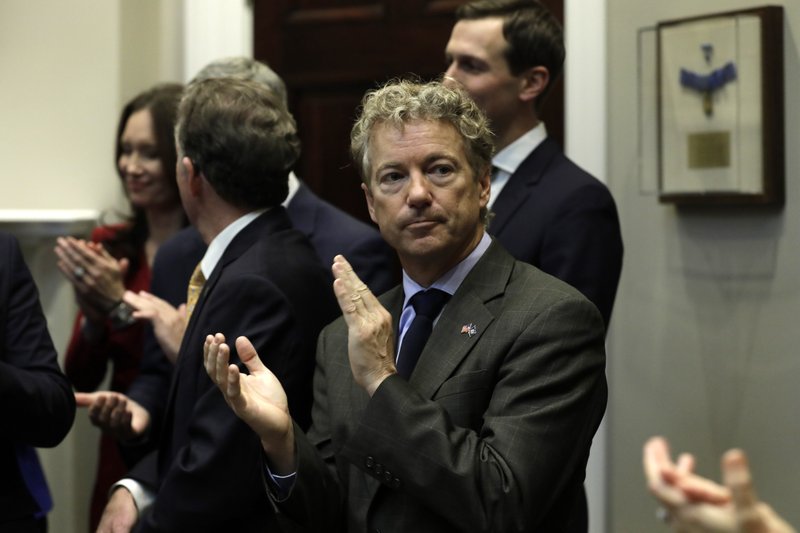The Senate on Thursday voted against an effort to block an arms sale to Bahrain -- pitched by backers as a means of forcing the island nation to stop participating in the Saudi-led coalition in Yemen.
It was shot down over concerns it would expose the United States to greater dangers in the Persian Gulf region.
Only 21 senators voted in support of the effort to end the arms sale, suggesting that while lawmakers are increasingly eager to punish Saudi Arabia over the murder of Saudi journalist Jamal Khashoggi, a Washington Post contributing columnist, most are not prepared to risk the United States' relations with other Saudi allies over the conflict.
Bahrain is a member of the nine-country coalition, led by Saudi Arabia, that has been carrying out airstrikes and other military actions in Yemen's civil war. Those actions have been criticized by human rights groups for seemingly targeting civilians and fomenting a humanitarian catastrophe in the war-torn country.
They have inspired passionate debate in the United States about whether Washington should continue supplying arms as well as air and intelligence support to the coalition.
But Bahrain is also home to most of the Navy's Fifth Fleet, the United States' most strategic military outpost against Iran in a region where the Islamic Republic's influence is spreading. And for most senators, maintaining good relations with the host country of that base is more important than trying to send an indirect message to Saudi Arabia by stopping military sales to a country that has contributed about a dozen planes to the Yemen effort.
"For us to block sales, offensive sales to the country of Bahrain that is housing one of our most important naval bases over something that has nothing to do with them but has something to do with another country, is not a pragmatic nor a sensible step," Senate Foreign Relations Committee Chairman Bob Corker, R-Tenn., said.
"This vote is not Yemen, it is not Saudi Arabia, it is not the United Arab Emirates, it is Bahrain," said Sen. Robert Menendez, D-N.J., the committee's top Democrat. "And Bahrain is a critical ally to us."
Sen. Rand Paul, R-Ky., who led the effort to block the sale of attack helicopters, missiles and other munitions to Bahrain, acknowledged that it would be "a proxy vote" at best, "because we're not being allowed a direct vote on the war in Yemen."
"The Saudis aren't getting the message. The Bahrainis are part of the coalition," Paul said. "Send them a message."
In recent weeks, President Donald Trump has announced plans to end in-flight refueling of Saudi planes operating in Yemen and issued sanctions against 17 Saudis accused of being involved in Khashoggi's murder -- a partial response to an appeal from the leaders of the Senate Foreign Relations Committee to consider imposing sanctions on the highest leaders of the Saudi kingdom, including Crown Prince Mohammed bin Salman.
But critics, including Paul, have been underwhelmed by that response, pointing out that Saudi leaders already had asked for the United States to end refueling its planes.
Paul also ridiculed Trump's sanctions, calling them "a way of pretending to something and doing nothing" and arguing that many of the sanctioned individuals were already in Saudi jails, probably facing the death penalty.
"People respect strength. We don't show strength unless we do something that is more dramatic than putting sanctions on people who are in prison," Paul said, stressing that even denying a Saudi ally one arms sale might affect decision-making in Manama, the capital of Bahrain, and Riyadh.
Paul has advocated invoking the War Powers Resolution to force the United States to fully end its support for Saudi Arabia's Yemen war effort.
But this year, senators were unable to muster enough votes to support such a measure.
In the House, Republican leaders blocked a similar effort Wednesday, tucking a rule change into a bill about managing the gray-wolf population that effectively blocked proponents of a resolution to end the war in Yemen, by nullifying a provision of the War Powers Resolution requiring expedited consideration for the specific Yemen measure.
Rep. Adam Smith, D-Wash., who is expected to become chairman of the House Armed Services Committee in January, promised that the effort to end Saudi Arabia's Yemen campaign would be revived under Democratic leadership.
"As the Yemeni people face the worst humanitarian crisis in the world, the urgency and need for congressional attention could not be greater," he said in a statement.
"A Democratic majority in the new Congress must reassert close oversight regarding Yemen."
A Section on 11/16/2018
